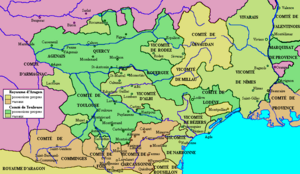Albigensian Crusade
| Albigensian Crusade | |||||||
|---|---|---|---|---|---|---|---|
| Part of the Crusades | |||||||
 Political map of Languedoc on the eve of the Albigensian Crusade |
|||||||
|
|||||||
| Belligerents | |||||||
| Kingdom of France | Crown of Aragon | ||||||
| Commanders and leaders | |||||||
|
Simon de Montfort† |
Raymond Roger Trencavel |
||||||
| Casualties and losses | |||||||
| At least 200,000 to at most 1,000,000Cathars killed | |||||||
| Considered by many historians to be an act of genocide against the Cathars including the coiner of the word genocide himself Raphael Lemkin | |||||||
Simon de Montfort†
Amaury VI of Montfort
Philip II of France
Raymond Roger Trencavel
Raymond VI of Toulouse
Raymond VII of Toulouse
The Albigensian Crusade or Cathar Crusade (1209–1229) was a 20-year military campaign initiated by Pope Innocent III to eliminate Catharism in Languedoc, in the south of France. The Crusade was prosecuted primarily by the French crown and promptly took on a political flavour, resulting in not only a significant reduction in the number of practising Cathars, but also a realignment of the County of Toulouse, bringing it into the sphere of the French crown and diminishing the distinct regional culture and high level of influence of the Counts of Barcelona.
The medieval Christian radical sect of the Cathars, against whom the crusade was directed, originated from an anti-materialist reform movement within the Bogomil churches of Dalmatia and Bulgaria calling for a return to the Christian message of perfection, poverty and preaching, combined with a rejection of the physical to the point of starvation. The reforms were a reaction against the often scandalous and dissolute lifestyles of the Catholic clergy in southern France. Their theology was basically dualist. Several of their practices, especially their belief in the inherent evil of the physical world, which conflicted with the doctrines of the Incarnation of Christ and transubstantiation, brought them the ire of the Catholic establishment. They became known as the Albigensians, because there were many adherents in the city of Albi and the surrounding area in the 12th and 13th centuries.
...
Wikipedia
